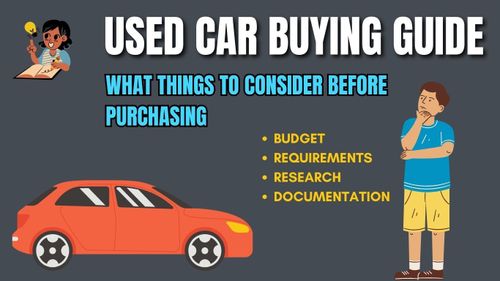What to look for before buying a used car in India?
By Mohit Kumar

44379 Views
Are you finding difficulty buying a used car? Don't worry here we have provided step by step guide so that you can easily purchase one.

Well, there is nothing wrong with Purchasing a used car and it will be a very wise decision, providing you with an affordable way to own a vehicle while saving on depreciation costs. However, it's essential to approach the process with caution and thoroughness.
In this comprehensive guide, we will explore the key factors to consider and the vital aspects to inspect when buying a used car in India. By following these guidelines, you can make an informed decision and drive away with a reliable and satisfactory vehicle.
Choose a Budget:
Before searching for a car for yourself in the used car market, decide on a realistic budget that suits your financials and requirements. Purchasing a used car will not be your only expense you will also have to consider insurance, maintenance and fuel consumption. This will help narrow down your options and prevent you from overspending.
Know Your Requirements:
After deciding the budget now you will have to jot down your needs and preferences in terms of vehicle body type, size, features, and fuel efficiency. If you are buying the car only for yourself or your family you will need to consider everyone’s requirements.
Check factors such as the purpose of the car where and for how much distance it will go on a daily basis, the number of passengers it should accommodate, and the driving conditions it will encounter. By having a clear idea of your requirements, you can focus on finding a used car that meets your specific needs.
Research and Shortlist:
Well, there are many sources to purchase a used car for example you can check with your friends and relatives if they are selling their car, second you can look at third-party websites where they sell used items and at last, you can find cars on used car selling platforms.
Each of these has its own advantages and disadvantages if you will buy from a known person then you will have an idea of the condition of that car. But not everyone has enough contacts so they go for third-party websites and there you will be uncertain regarding the quality and condition of that used car.
At last, you will visit the proper platform to buy a used car where they do quality checks and all but the thing is they charge a commission that increases the price of that used car.
So Conduct thorough research to shortlist the most reliable and suitable car models within your budget. Consider factors such as brand reputation, ownership costs, availability of spare parts, and the resale value of different models.
You can read from Online resources, customer reviews, and automotive forums can provide valuable insights into the performance and reliability of specific car models.
Check out the Car’s History:
Once you have finished your search and chosen the used car of your choice, it is crucial to learn more about its history by looking up the VIN or chassis number.
It will provide you with information on the previous owners of that used automobile and will display crucial details like the number of previous owners, whether the car has been in any accidents, its service history, and whether any loans are still owed on it.
You will have a better understanding of the car's condition and any potential issues once you are aware of these items.
Physical Inspection:
Before making a final decision, perform a thorough physical inspection of the used car. Here are some key areas to focus on:
Exterior:
Look for signs of rust, dents, scratches, or paint mismatch, as these may indicate previous accidents or inadequate maintenance.
Interior:
Inspect the condition of the seats, upholstery, dashboard, and controls. Check for unusual odours, stains, or excessive wear and tear.
Engine:
Examine the engine bay for any leaks, loose belts, or damaged components. Consider seeking professional assistance to assess the engine's health and performance.
Mileage:
Check the odometer reading and compare it with the vehicle's overall covered distance. Suspiciously low or high mileage could indicate tampering or excessive wear.
Test Drive:
Ask the owner if you want to do the test drive in different road conditions. Then notice engine performance, suspension, braking, steering responsiveness, and any unusual noises or vibrations.
Professional Inspection:
In many cases, people do not have any idea of the condition of that used vehicle. That’s why getting a professional mechanic to conduct a detailed inspection is necessary.
They can provide a detailed assessment of the car's mechanical condition, electrical systems, and overall roadworthiness. While it may involve an additional cost but it can potentially save you from unexpected repair expenses in the future.
Documentation and Legal Formalities:
After inspection now you have to ensure that all necessary documents are in order. This includes the car's registration certificate, insurance papers, pollution certificate, and transfer of ownership documents. Verify each of these documents whether it’s real or not and cross-check the details with the seller to avoid any legal complications.
Negotiation and Financing:
Once you are satisfied with the condition of the used car and its paperwork, negotiate the price with the seller. Conduct market research to determine a fair price based on the vehicle's age, condition, and other aspects that have been mentioned above.